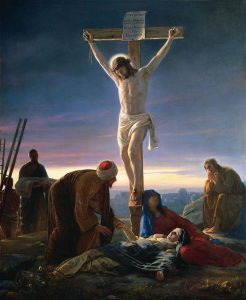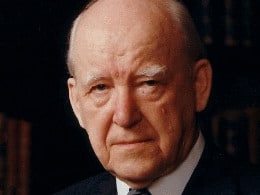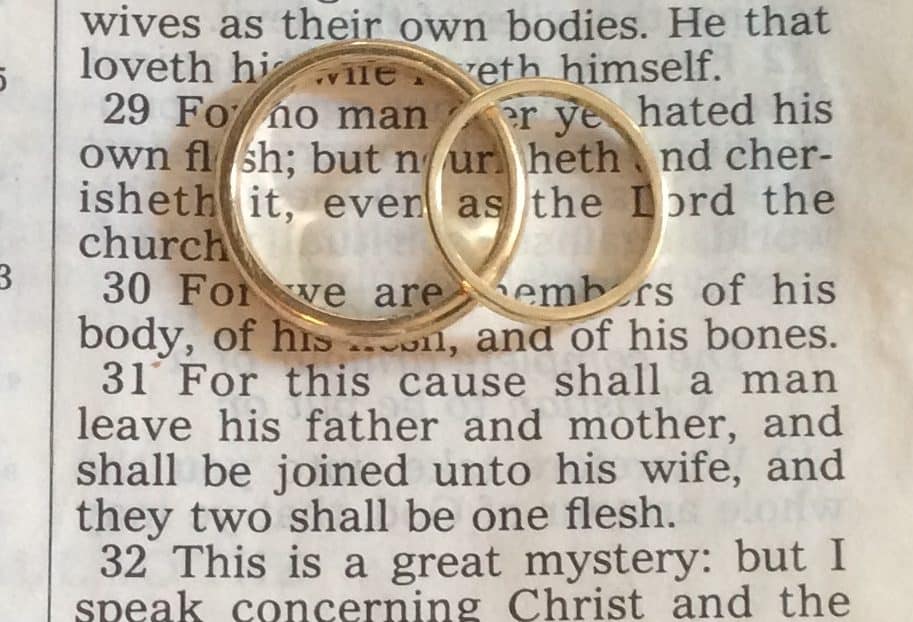Marriage is a significant institution by which a lost world can see Christianity in action.
—Don and Sally Meredith—
Key point: Many Christians today, including many pastors, act as though upholding man-woman marriage will drive people away from Christ and the church. Nothing could be further from the truth. The fact is that we can uphold the gospel by upholding God-ordained marriage. Pastors must take the lead in explaining to believers the theological underpinnings of biblical marriage, including how marriage reflects Christ’s sacrifice for the church.
I have long been concerned that the evangelical church, for many years now, has been “all in” with regard to helping married couples improve their individual marriages without making an intentional and concerted effort to uphold and protect the institution of marriage as God designed it. In this post I’d like to explore an important reason churches, Christian ministries, and individual believers must be intentional and strong in emphasizing the importance of marriage as God designed it. After all, Hebrews 13:4 declares, “Marriage should be honored by all, and the marriage bed kept pure, for God will judge the adulterer and all the sexually immoral.”
I will make my case primarily from a biblical, and thus a theological, perspective. It is incumbent upon pastors to take this baton and run with it, educating the believers in their congregations about the importance of upholding God’s design for marriage. To all my friends out there who are pastors—will you take seriously this task, embrace it, and work to fulfill it? God will bless you and your church as you do, because, as we will see, to uphold man-woman marriage is to uphold the gospel itself.
Clarity Needed
When a church renovated its worship center, the decision was made to hang a beautiful portrait of Christ on the wall directly behind the pulpit. When the pastor got up to deliver his message on the Sunday morning after the renovation was complete, a little boy in the congregation who was still new to the church’s worship services asked his mother, “Mom, who is that man who stands so we can’t see Jesus?”1

Portraits of Christ are important. They’re particularly important to God—especially those He Himself presents in Scripture. We need to make sure that we never obstruct them—that we never “stand so people can’t see Jesus.” Instead, we must faithfully present these images so they can convey all God wants them to convey.
Striking the Rock
If Moses could, he almost certainly would stress to us the importance of faithfully presenting divinely crafted representations. In a fit of uncontrolled emotion, the man who led God’s people out of Egypt distorted a picture of Christ that God intended to showcase to Israel, and, through the pages of Scripture, to future generations of people everywhere. Making their way across the wilderness after being freed from slavery in Egypt, the Israelites lacked water, and they grumbled and complained. Moses and Aaron met with the Lord, who instructed Moses, “Take the staff, and you and your brother Aaron gather the assembly together. Speak to that rock before their eyes and it will pour out its water. You will bring water out of the rock for the community so they and their livestock can drink.” (Num. 20:8; vv. 1-13 provide the context).

Moses, however, didn’t speak to the rock. Overcome with frustration and anger, he took his rod and hit it twice. While life-sustaining water did pour out, God punished Moses for not obeying Him: “Because you did not trust in me enough to honor me as holy in the sight of the Israelites, you will not bring this community into the land I give them.” (v. 12). Verse 13 tells us “These were the waters of Meribah.” The term Meribah means “contention” or “argument.” In this place the Israelites complained against God.
Why was God so upset? Disobedience always displeases the Lord, but here something else was involved as well. Exodus 17 indicates that earlier, at a place called Rephidim, a similar situation unfolded. Water was nowhere to be found. The people complained there, too, but God told Moses what He needed to do to set the stage for a miracle. “I will stand there before you by the rock at Horeb,” the Lord said. “Strike the rock, and water will come out of it for the people to drink.” (Ex. 17:6). Moses obeyed God, and even though the people had grumbled, they had water to drink. This place also was called Massah, meaning test or temptation, and Meribah, the same name given to the waters mentioned in in Numbers 20. The differences in what occurred in Exodus 17 and Numbers 20, however, indicate these were two different places.
 We need to understand that in Numbers 20, Moses ruined a divinely orchestrated picture of Christ. Jesus is the Rock (see 1 Cor. 10:1-4; Eph. 2:19-21; 1 Pet. 2:4-8). He also is the source of “living water” (John 4:10-14; 6:35; 7:37-39). He had to die, or be struck, only once. Based on His death, salvation comes to all who repent of their sins and trust Him for forgiveness and eternal life. In other words, sinners need only speak to Him—for, having already died, He stands ready, willing, able, and even anxious to forgive (see Heb. 7:25-28).
We need to understand that in Numbers 20, Moses ruined a divinely orchestrated picture of Christ. Jesus is the Rock (see 1 Cor. 10:1-4; Eph. 2:19-21; 1 Pet. 2:4-8). He also is the source of “living water” (John 4:10-14; 6:35; 7:37-39). He had to die, or be struck, only once. Based on His death, salvation comes to all who repent of their sins and trust Him for forgiveness and eternal life. In other words, sinners need only speak to Him—for, having already died, He stands ready, willing, able, and even anxious to forgive (see Heb. 7:25-28).
We see just how important this portrait of Jesus was to God when we realize that because of Moses’ disobedience, the Lord would not let His servant enter the promised land. Later, when the Israelites were about to take possession of the land, Moses recounted that he had asked God to reconsider, but the Lord said, “That is enough. Do not speak to me anymore about this matter” (Deut. 3:26; vv. 21-29 provide the context). Does this sound harsh? If it does, we need to remember that God is God. His judgments don’t reflect His opinions but His perfect character—and reality.
Having been struck once when He died, Jesus does not need to be hit again, but only spoken to. He stands ready, willing, able, and even anxious to forgive all who call out to Him and rely on Him for salvation and forgiveness.
The Lord’s Supper
 In the New Testament, we see that a similar situation unfolded in the Corinthian Church with regard to the Lord’s Supper. Paul wrote these words in 1 Corinthians 11:
In the New Testament, we see that a similar situation unfolded in the Corinthian Church with regard to the Lord’s Supper. Paul wrote these words in 1 Corinthians 11:
27 So then, whoever eats the bread or drinks the cup of the Lord in an unworthy manner will be guilty of sinning against the body and blood of the Lord. 28 Everyone ought to examine themselves before they eat of the bread and drink from the cup. 29 For those who eat and drink without discerning the body of Christ eat and drink judgment on themselves. 30 That is why many among you are weak and sick, and a number of you have fallen asleep.
In other words, some had died because they failed to approach the Lord’s Supper with necessary reverence and respect. Remember—the Lord’s Supper is a divinely created picture of the sacrifice of Jesus’ body and blood on the cross.
The Rainbow
We can be assured that God is keenly aware of divine signs and images that are being misrepresented today, whether they represent Christ and his sacrifice directly or not. Thousands of years ago, God placed the first rainbow in the sky as a reminder 1) of His faithfulness after the flood of Noah, and 2) of His promise never again to destroy the earth with a flood (see Gen. 9:8-17). Sadly, today many people see rainbow colors and celebrate evil in the name of the politically correct principles of “diversity” and “inclusiveness.” Significantly, the LGBT rainbow has six colors, and the rainbow God set forth to be displayed in nature has seven. The fact that the counterfeit rainbow is used to celebrate sin represents a defiant attitude toward God, one He will not overlook.
Marriage

Then there’s marriage. A sacred institution ordained and instituted by God and upheld by Christ (see Gen. 2:18-25; Matt. 19:4-6), marriage also is picture of Christ’s relationship with His church (see Eph. 5:22-32). Recall the words of the first stanza of the timeless hymn, “The Church’s One Foundation” by Samuel Stone (1839-1900).
The Church’s one foundation
Is JESUS CHRIST, her Lord;
She is His new creation
By water and the Word;
From heav’n He came and sought her
To be His holy bride;
With His own blood He bought her,
And for her life He died.
Needless to say, that picture is being muddied and distorted everywhere people look. Of course, because marriage is what God says it is and can’t be anything else, those “changing” its definition are fooling themselves. They’re hurting a lot of other people in the process as well, including homosexuals who say they want to be “married.” As you know, in 2015 the Supreme Court of the United States mandated that if a same-sex couple wants their relationship to be a marriage, it must be treated that way by society and in terms of government policy.
Consider what we are losing with regard to the message marriage is divinely ordained to convey—not primarily through individual marriages, but through marriage as an institution. How can marriage possibly continue to represent in society anything close to the relationship God intended it to represent?
How can marriage possibly continue to represent in society anything close to the relationship God intended it to represent?

If we lose the true definition of marriage completely in our culture, we will lose an image that helps people understand why Christ died. While we cannot expect non-Christians to act as Christians, neither can we ignore the fact that America was founded on Judeo-Christian principles and for many years upheld those ideals. Yet in recent decades in this country, we, as a nation, have kicked God out of public life. Given all the opportunities we as Americans have had to hear and respond to God’s truth, we must understand that God will hold us accountable.
Swimming Upstream Against the Culture
What, then, does it mean in our day to stand so people can see Jesus clearly? We can cite at a growing number of examples of believers who are so standing, including Barronelle Stutzman of Richland, Washington, who is putting her livelihood and all her possessions on the line to uphold genuine marriage. Colorado cake artist Jack Phillips also has risked everything to take a stand for Christ by taking a stand for biblical marriage. While he won his case at the Supreme Court, the Justices, unfortunately, did not recognize what they should have affirmed—the Constitutional right of every American to follow the dictates of his or her deeply held religious beliefs. Neither Jack nor any other individual should be forced to make a statement that violates his or her conscience. If we do not have pastors who will boldly defend our God-given right to speak and live according to our convictions, we will lose it!
Genuine Love Upholds the Truth
But how, someone might ask, are Jack Phillips and others who are turning down opportunities to perform their services for same-sex “weddings” reflecting Christ’s love? We need to understand that it never can be loving to participate in a lie, and this is exactly what Stutzman, Phillips, and many others either have been told, or currently are being told, they must do. “Love,” the apostle Paul wrote, “does not delight in evil but rejoices with the truth.”
It never can be loving to participate in a lie.
Well, aren’t Phillips, Stutzman, and others who are upholding marriage offending people, and thereby pushing them away from Christ? No more than the gospel itself drives people away. Here’s the thing. The gospel is inherently offensive. In fact, “stripped of its ability to offend, the message of the gospel also is robbed of its power to save.” Please, let this last statement sink in.
Stripped of its ability to offend, the message of the gospel also is robbed of its power to save.
I realize this idea may raise questions in your mind. It rubs against modern sensibilities, but we are foolish if we dismiss it outright. Go here to explore why the gospel can’t save if our evangelistic presentations give it no capacity to offend.

Contrary to conventional wisdom, the reality is that those who have taken a bold stand for marriage have presented Christ so clearly that some have been drawn to place their faith in him. Jack Phillips’s own nephew is one such individual. Others have been encouraged to uphold biblical truth. As Martyn Lloyd-Jones has affirmed, “When the church is absolutely different from the world, she invariably attracts it. It is then that the world is made to listen to her message, though it may hate it at first.”
If you are a pastor, please explain to your congregation the profound links between God-ordained marriage and the gospel. You can start by showing them how marriage, as well as the other divinely-created symbols we have discussed here, represent something special and sacred. Marriage is a divinely crafted institution that people—especially believers—should never treat lightly but must respect and revere.
For an excellent example of an entire sermon showcasing the theology of marriage, go here.
Compromise Is Unloving
Greg Quinlan is a former homosexual. He is the founder of the Center for Garden State Families and today serves as its president. His perspective on ministry to homosexuals is rooted in part in a clear understanding of the way the early Christians lived out their faith in the first century. Here are his insights.
The reason we see so much of a proliferation of homosexuality in our society now is because we live in a sex-saturated culture.…The first century church thrived in a hyper-sexualized homosexual culture in an age of sexual anarchy. So can the 21st century church. We do not need to compromise our message in order to bring homosexuals into the church or accommodate them.…The truth is the truth, and if we love someone, we will tell them the truth that homosexuality is destructive to someone. I know because I watched 100 of my friends die of AIDS.
There are many inappropriate and unloving ways to uphold the truth, but there never can be a loving way to distort it.
Certainly there are many inappropriate and unloving ways to uphold the truth, but there never can be a loving way to distort it.
Copyright © 2019 by B. Nathaniel Sullivan. All Rights Reserved.
Adapted from an article by B. Nathaniel Sullivan originally published in 2015.
Note:
1Adapted from an illustration from Vance Havner
This article is an updated version of the first post in a series titled “Upholding God-Ordained Marriage Is One of the Greatest Ways to Uphold the Gospel.” If you’re a pastor wondering how to help your people understand the biblical and theological underpinnings of God-ordained marriage, this series can be a helpful resource for you in your sermon and Bible study preparation.
For further reading: No, Christianity Doesn’t Need To Endorse Homosexuality To Grow by Glenn Stanton
image credits:
- communion token/reminder: This Do in Remembrance of Me
- grape juice and communion bread
Unless otherwise indicated, all Scripture passages are taken from the Holy Bible, New International Version®, NIV® Copyright © 1973, 1978, 1984, 2011 by Biblica, Inc.® Used by permission. All rights reserved worldwide.



Be First to Comment